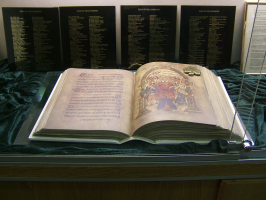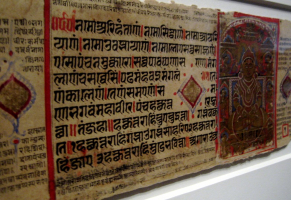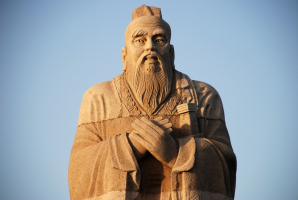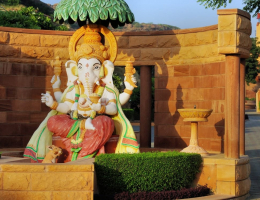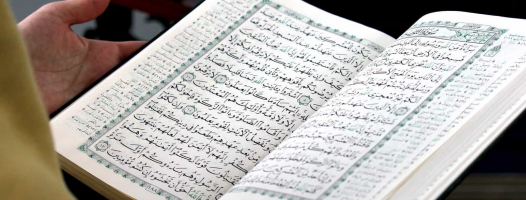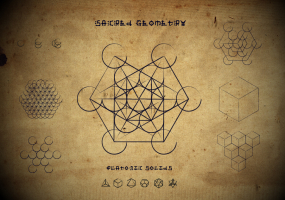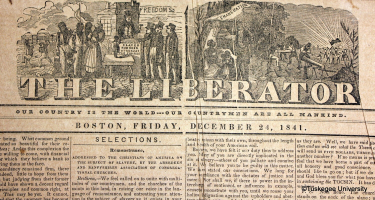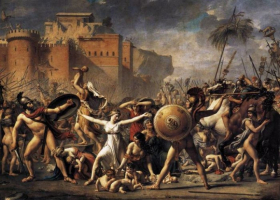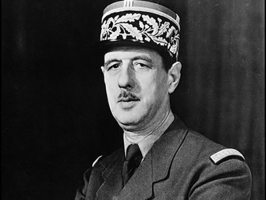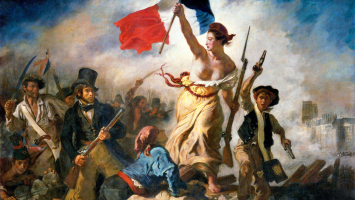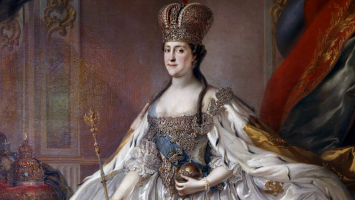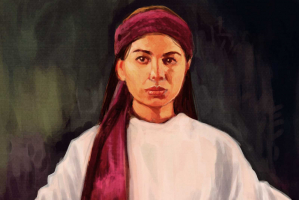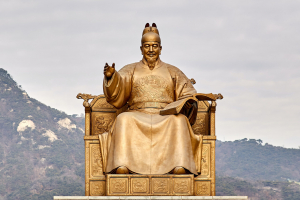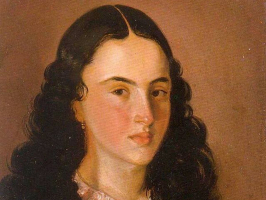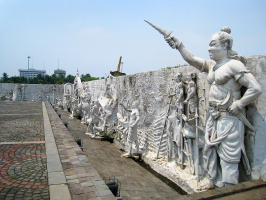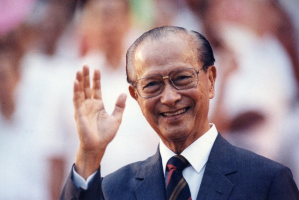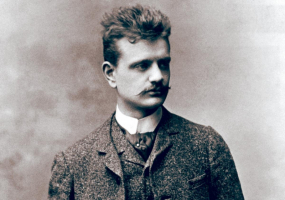Top 10 Most Important Taoism Sacred Texts
Step into the world of ancient wisdom with the most important Taoism sacred texts! These timeless writings hold keys to understanding life, being yourself, and ... read more...finding peace in the present moment. So, if you're ready to chill out and live in harmony with the universe, give Taoism a try. You might be surprised at how much it can change your life.
-
The Tao Te Ching, attributed to the sage Laozi, is one of the most profound and influential texts in Taoism. Comprised of 81 short chapters, it guides us on living in harmony with the Tao, the fundamental principle underlying all existence.
At its heart, the Tao Te Ching explores the concept of "Tao," which can be translated as "the way" or "the path." Tao is formless, ineffable, and beyond intellectual grasp. It is like the flow of a river; it's everywhere but hard to explain because it's so natural. Laozi encourages people to live in harmony with this natural flow and keep things simple and humble.
The Tao Te Ching is full of short poems that make you think. Laozi uses simple words to share deep ideas. In this text, he addresses "te," which means being a good person with strong values. It's about having inner strength, being kind to others, and living in harmony with nature.
One big idea in the Tao Te Ching is "wu wei," which means "non-action" or "effortless action." It's not about doing nothing; it's about doing things in a natural and effortless way, without forcing or pushing too hard. Laozi thought that by going with the flow of life and not trying to control everything, people could find more peace and happiness.
As one of the most important Taoism sacred texts, the Tao Te Ching is not just for people who follow Taoism. Its wise words have influenced many people worldwide, from philosophers to leaders, because they teach us how to find peace within ourselves and live in harmony with the world around us. It encourages people to be open-minded, to embrace change, and to see the beauty in simplicity.
Link to buy: https://www.amazon.com/Tao-Te-Ching-Lao-Tzu/dp/1690029994/
Link to read: https://sacred-texts.com/tao/taote.htm
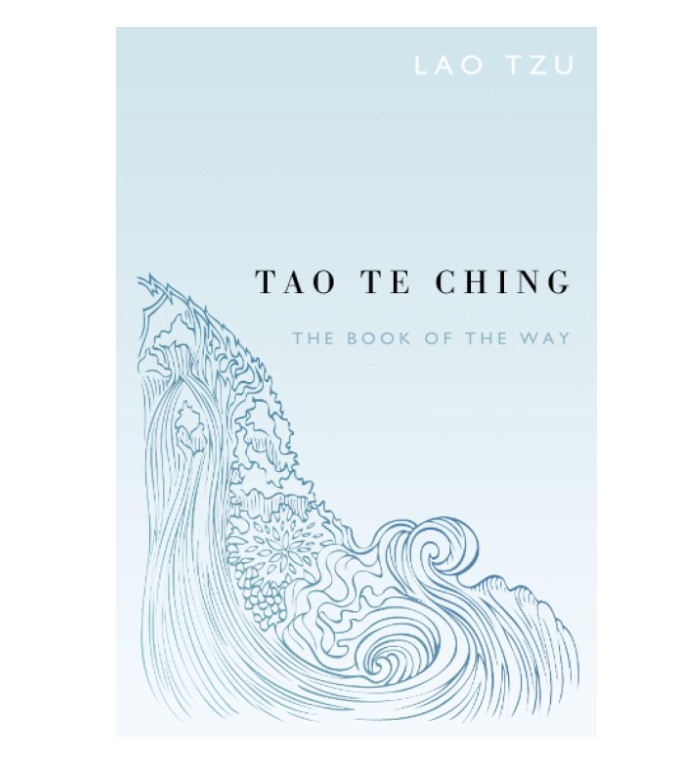
Screenshot of https://www.amazon.com/ 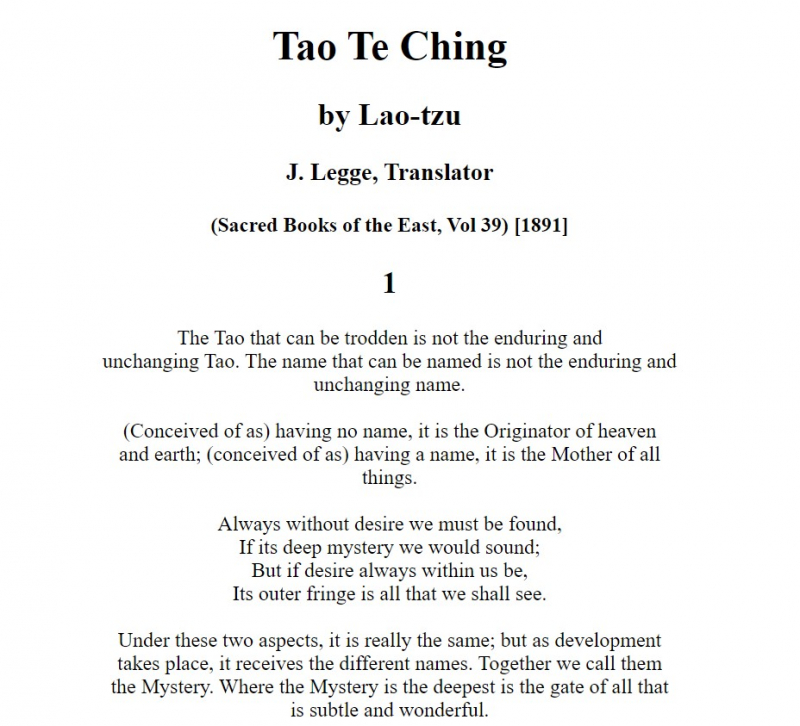
Screenshot of https://sacred-texts.com/tao/taote.htm -
The Zhuangzi, also known as Chuang Tzu, is a remarkable book filled with stories and ideas that teach us about life and the world. It's named after its wise author, Zhuang Zhou, who lived during the Warring States period in ancient China. This text is considered one of the foundational works of Daoism alongside the Tao Te Ching, but it presents its ideas in a more playful and imaginative manner.
A central theme in the Zhuangzi is the idea of "ziran," which means being natural. Zhuangzi says we should be like nature, just being ourselves without trying to be someone else. He tells us to be like nature, to live freely and without worries, just like big fish that's happy in a huge ocean and a little bird that's free in the sky.
Zhuangzi also talks about how we see things. He says that sometimes what we see might not be the whole truth. For example, when we dream, things seem real even if they're not. So, he wants us to think deeper and not always believe everything we see. Another cool concept discussed is "wu wei," which means doing things naturally without forcing them. It's like floating in water and letting the current take you instead of struggling against it.
In the list of most important Taoism sacred texts, the Zhuangzi is a mind-expanding journey full of interesting stories and profound wisdom. Even though it's an old book, Zhuangzi's ideas are still super relevant today. It challenges our minds, promotes critical thinking, and makes us see the world in a whole new light.
Link to buy: https://www.amazon.com/Book-Chuang-Tzu-Penguin-Classics/dp/014045537X
Link to read: https://terebess.hu/english/tao/Zhuangzi-Burton-Watson.pdf
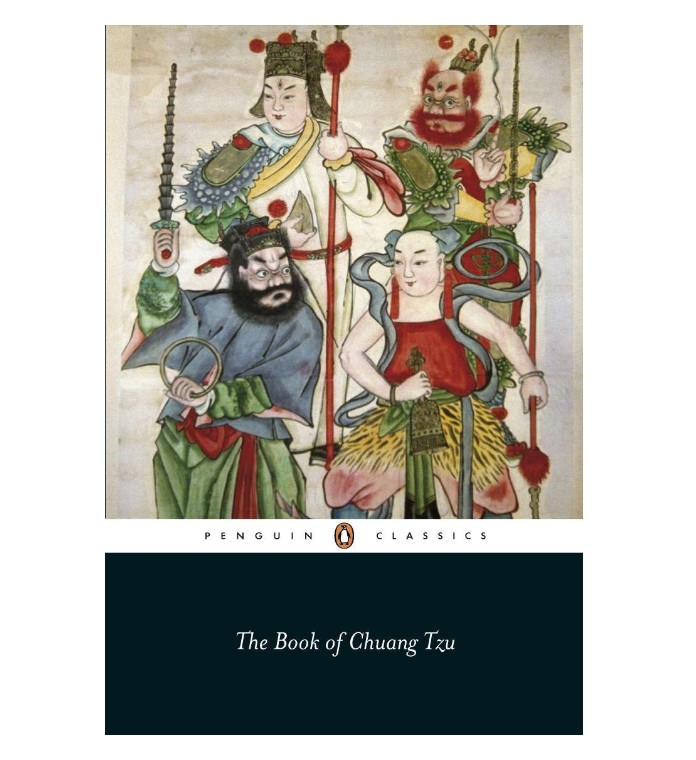
Screenshot of https://www.amazon.com/ 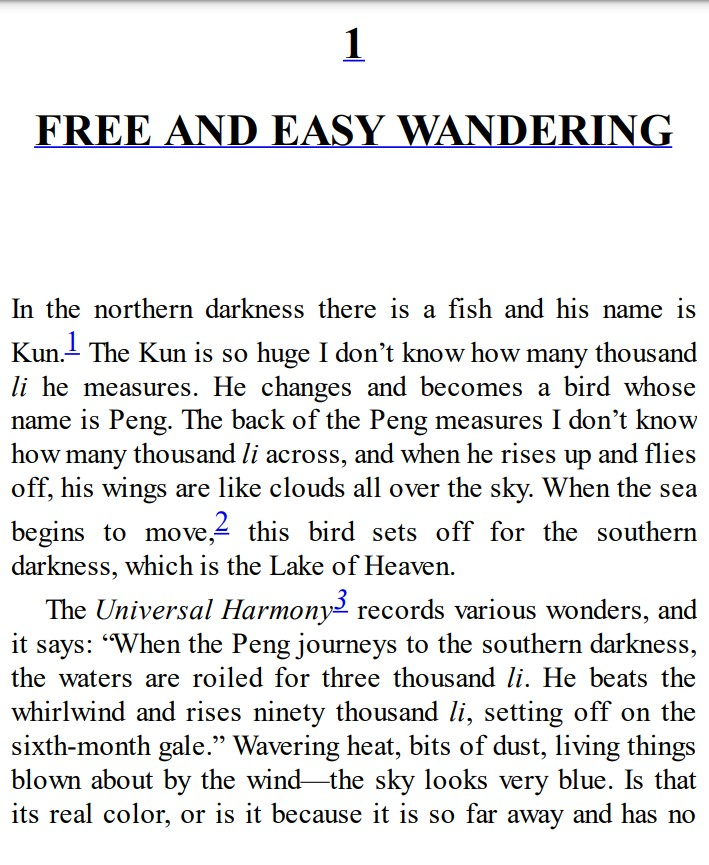
Screenshot of https://terebess.hu/english/tao/Zhuangzi-Burton-Watson.pdf -
The I Ching, also known as the Book of Changes or Yi Jing, is a very important and ancient text in Taoism and Chinese philosophy. This text is special because it's not just a book to read; it's also a tool for divination, which means people use it to get guidance about the future or advice about their lives. It's like asking the universe for help in understanding what might happen or what choices to make.
The book focuses on 64 symbols called hexagrams, which are made up of six lines, either broken or solid, stacked on top of each other. These hexagrams represent different situations in life, like joy, difficulty, or change. People consult the I Ching by throwing coins or using yarrow sticks to create a hexagram. Then, they read the associated wisdom and guidance from the book.
A key idea in the I Ching is the concept of change. It shows that everything in life goes through cycles, just like the seasons change. The book teaches us to flow with these changes and adapt, much like the Taoist principle of "wu wei," or going with the flow. By understanding these changes, people can make better decisions and find balance.
The I Ching also introduces the idea of Yin and Yang, which represent the balance of opposites. Yin is like the dark, quiet, and feminine side, while Yang is the bright, active, and masculine side. The interaction of Yin and Yang is a fundamental principle in Taoist philosophy.
The I Ching is truly a wise guide that people have used for thousands of years to understand the world and make decisions. It has influenced not only Taoism but also Confucianism and other philosophies. Its teachings on adaptability, balance, and harmony resonate with many folks seeking guidance and understanding in a world that's always changing.
Link to buy: https://www.amazon.com/Ching-Book-Changes-Bollingen-General/dp/069109750X
Link to read: http://wengu.tartarie.com/wg/wengu.php?l=Yijing&no=0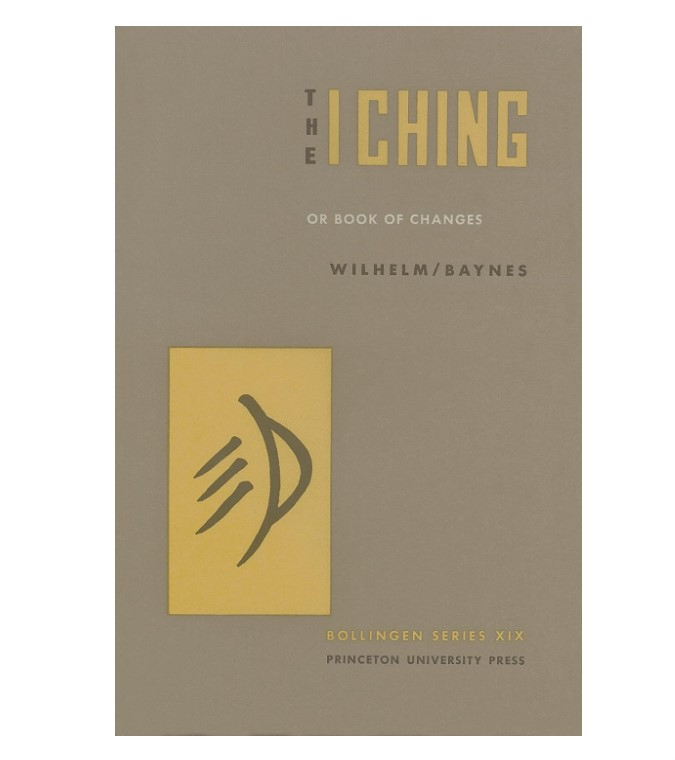
Screenshot of https://www.amazon.com/ 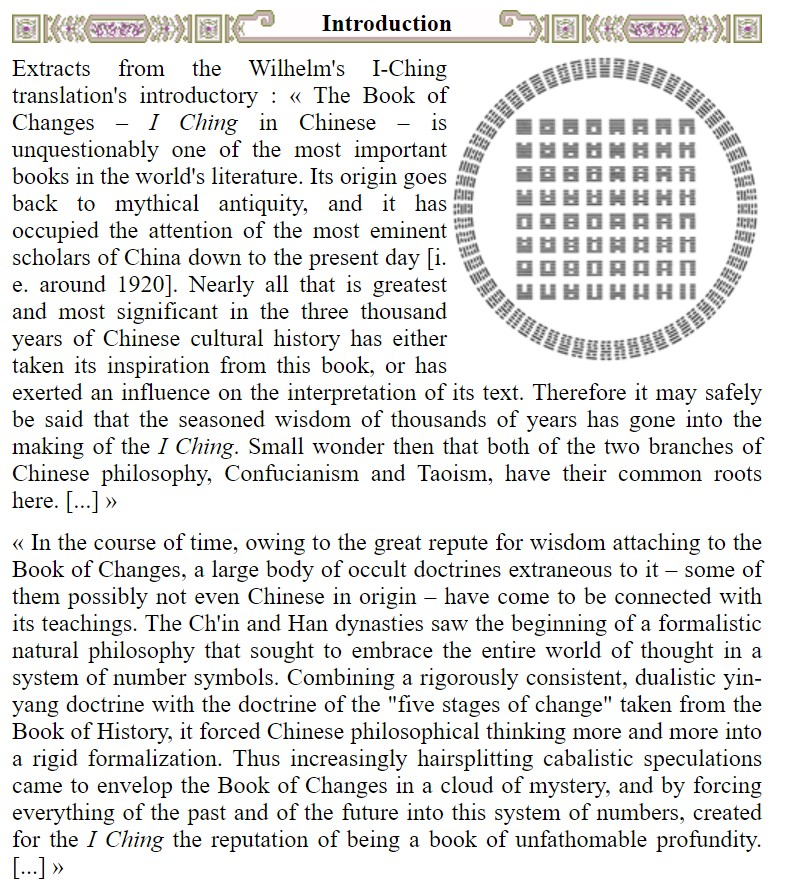
Screenshot of http://wengu.tartarie.com/wg/wengu.php?l=Yijing&no=0 -
The Daozang, or Taoist Canon, is like a massive treasure chest filled with all kinds of Taoist teachings, rituals, and wisdom. It's a huge collection of texts that bring together centuries of Taoist thought and practice. Think of it as the ultimate library for all things Taoism
.
This collection is gigantic, seriously! It's got writings from different Taoist schools and masters. With around 1,500 different texts, it covers everything from philosophy and meditation techniques to alchemy, medicine, rituals, and even stories about gods and immortals. Some of these texts date back to ancient times, while others were added over the centuries.
Within the Daozang, you'll find classics like the Tao Te Ching and the Zhuangzi, alongside texts on things like inner alchemy, where they explore transforming the self and achieving immortality. Other sections focus on rituals, spells, and practices for health, longevity, and connecting with the spiritual realm.
Over time, different versions of the Daozang have been compiled, each adding new texts or interpretations. It's like an encyclopedia that keeps growing and is not easy to understand. Some texts are super cryptic, and others might contradict each other because they come from different times and Taoist traditions.
However, if you ever want to dive into the depths of Taoism and explore its many aspects, the Daozang is still the ultimate place to start. It offers a vast array of knowledge and perfect guidance for those seeking to understand and follow the Taoist way of life.
Link to buy: https://www.amazon.com/Taoist-Canon-Historical-Companion-Daozang-ebook/dp/B07Z1SRVZ7/
Link to read: https://bom.so/Daozang-Taoist-Canon
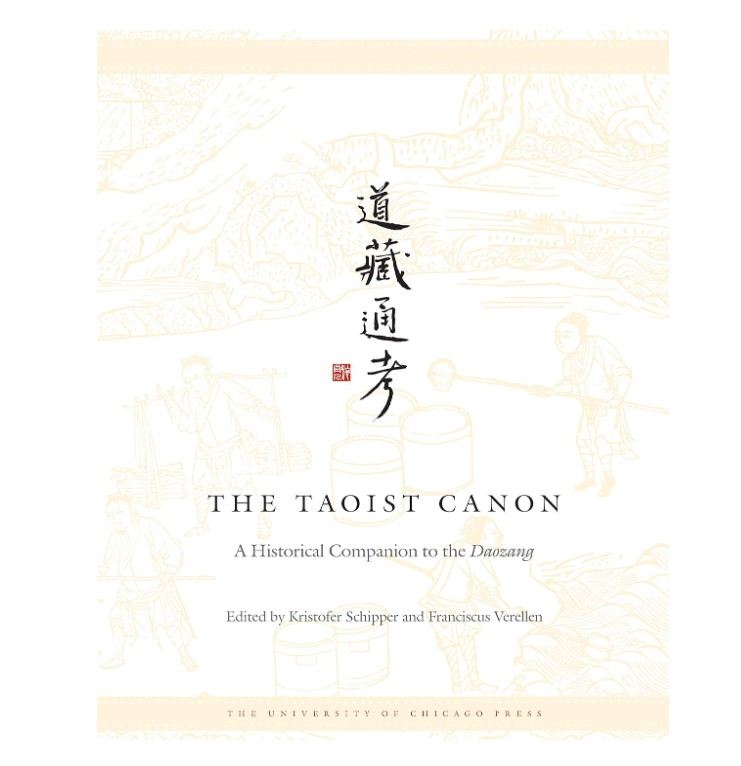
Screenshot of https://www.amazon.com/ 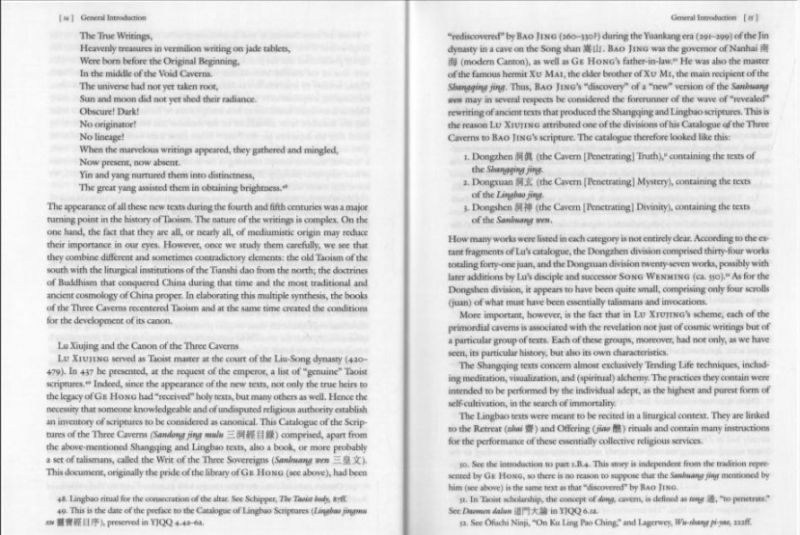
Screenshot of https://bom.so/Daozang-Taoist-Canon -
Neiye, which means "inward training," is a text that dives deep into the art of inner cultivation and finding peace within ourselves, following Taoist principles. This text talks all about inner peace, meditation, and becoming a better version of yourself. It reminds us to slow down, breathe, and appreciate life.
As one of the most important Taoism sacred texts, Neiye might be short, but it's packed with big ideas. It teaches you how to look inside yourself, quiet the noisy thoughts, and find harmony. It's like a roadmap for calming your mind and finding balance in a busy world. The Neiye suggests that by turning our attention inward, we can tap into a wellspring of energy and wisdom. It's like saying, "Hey, the answers you seek aren't always out there; sometimes, they're right inside you."
This Taoist sacred text explores the idea called "xingming," which means "mind and body in harmony." It's about getting your mind and body to work together, like a smooth team. When they're in sync, it helps you be healthier, happier, and more focused.
It also teaches us a unique technique called "fasting of the mind." No, it's not about skipping meals! It's about letting go of worries and distractions, giving your mind a break from all the buzzing thoughts. There's this idea of balancing our emotions and not letting them run wild like a bunch of wild horses.
Neiye is like a friendly reminder that, amidst the chaos of the external world, there's a sanctuary within us waiting to be explored. So, if you ever feel like life's a bit too much, the Neiye might just have some ancient wisdom to offer, helping you find peace, balance, and a deeper connection with yourself.
Link to buy: https://www.amazon.com/Original-Tao-Foundations-Mysticism-Translations/dp/0231115652
Link to read: https://www.gutenberg.org/files/38585/38585-pdf/38585-pdf.pdf
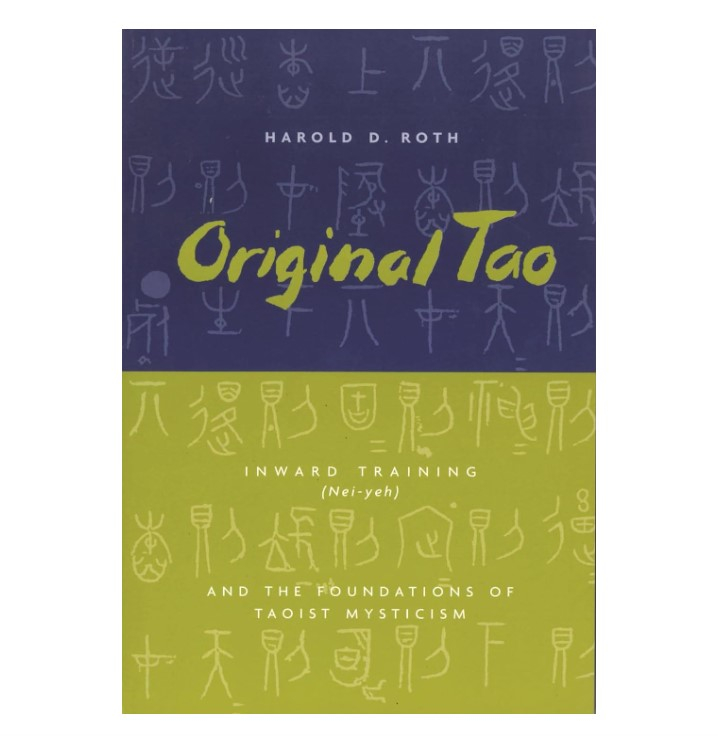
Screenshot of https://www.amazon.com/ 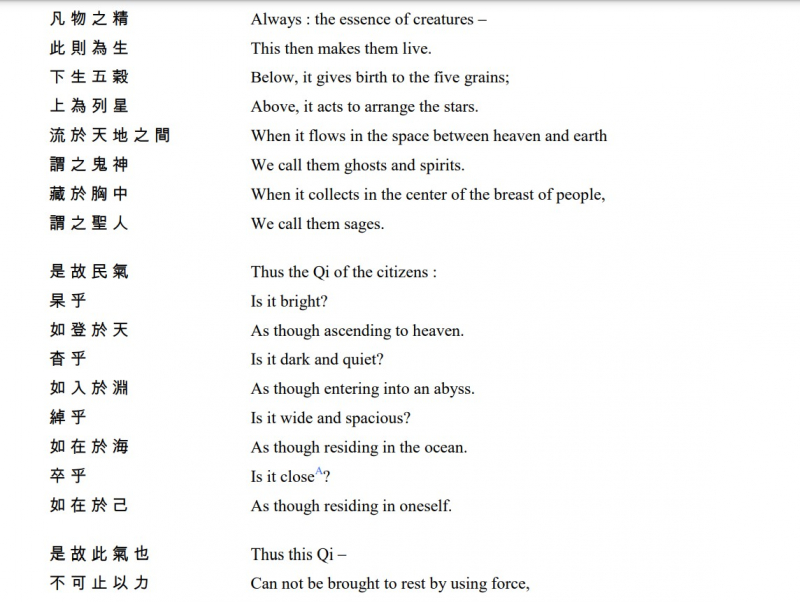
Screenshot of https://www.gutenberg.org/files/38585/38585-pdf/38585-pdf.pdf -
The Liezi, also known as the Lieh Tzu, is a collection of Taoist teachings by Lie Yukou, a philosopher and thinker from ancient China. Unlike some other Taoist texts that focus more on the nature of the Tao or the Way, the Liezi is all about sharing wisdom through storytelling. It's like sitting around a campfire, listening to fascinating tales that carry hidden lessons about life and the universe.
The Liezi covers a wide range of topics, exploring concepts like naturalism, spontaneity, and the art of living harmoniously with the world. Through its fascinating and profound stories, it offers insights into human nature, society, and the mysteries of existence.
Liezi's favorite topic is "ziran," which means naturalness. It's like going with the flow of life, being as natural as a breeze in the trees. Lieh Tzu would tell stories about birds, trees, and even water buffaloes to show how living in harmony with nature is the key to a happy life. It's like saying, "Hey, sometimes the best things happen when you're not trying too hard."
Another impressive thing is how Liezi shares ideas about how to live a simple and genuine life. It talks about letting go of unnecessary stuff, both physically and in our minds, and finding happiness in simplicity. It's like a reminder to chill out and not get caught up in chasing things we don't really need.
The Liezi has been around for ages and has influenced a lot of folks who are into Taoism and philosophy. This isn't your typical heavy philosophy book. It's more like a friendly chat with a wise storyteller who wants you to see the world in a new light. So, if you're into stories that make you think and smile, Liezi might just be your cup of tea!
Link to buy: https://www.amazon.com/Lieh-tzu-Taoist-Practical-Shambhala-Editions/dp/1570628998/
Link to read: https://sacred-texts.com/tao/tt/index.htm
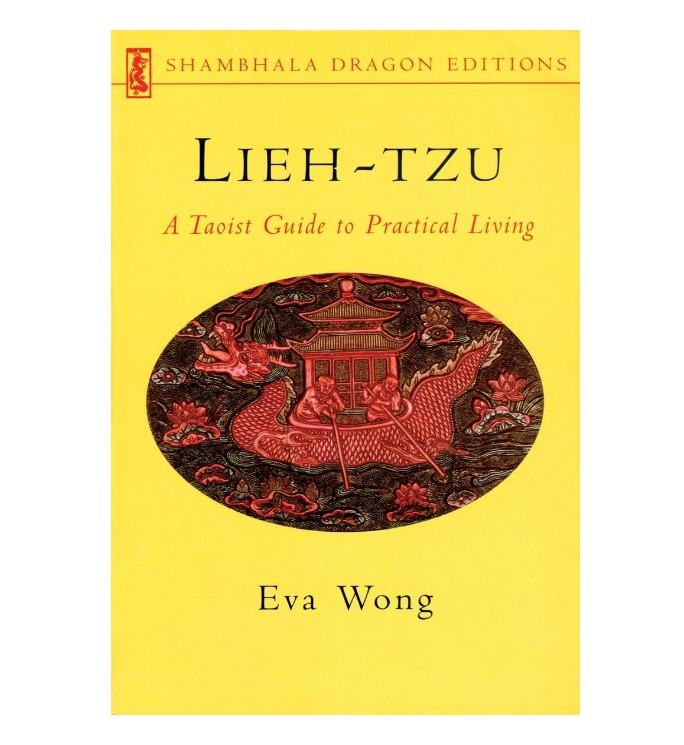
Screenshot of https://www.amazon.com/ 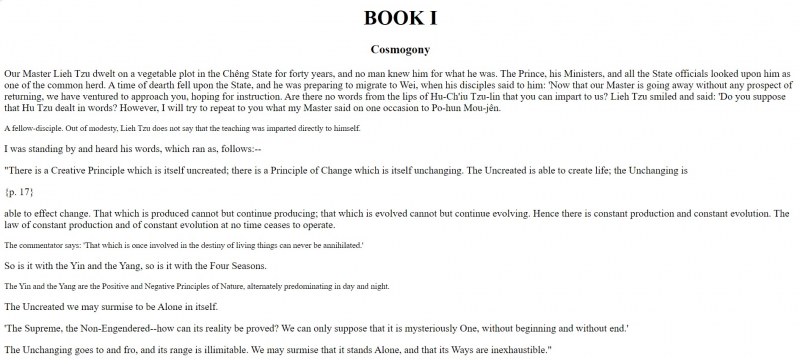
Screenshot of https://sacred-texts.com/tao/tt/index.htm -
The Qingjing Jing, or the Classic of Purity, is like a guidebook to finding inner calm and clarity in a noisy world. This ancient text is all about purity—not just in the sense of cleanliness but also in keeping our minds and hearts clear and simple. It's like saying, "Hey, let's declutter our inner space."
This classic addresses the main idea of the importance of stillness. It's like finding a peaceful pond within ourselves. By being still, we can see things more clearly, just like how the water reflects the world around it when it's calm. This book also talks about meditation and how it can help us find that quiet place within ourselves. It's not about sitting cross-legged on a mountain (although that can be cool too); it's more about a road map to your inner oasis, which helps you harness good energy from within.
The Qingjing Jing suggests that by simplifying our lives and thoughts, we can find harmony. It's like saying, "You don't need all the fancy stuff; sometimes, simplicity is the key to true happiness." By letting go of unnecessary desires and worries, we can find contentment in the present moment.
The Qingjing Jing doesn't have complicated rules or long lectures. Instead, it's like a gentle reminder to slow down, take a breather, and appreciate the beauty around us. So, if you ever feel like life's moving a bit too fast or things are getting too noisy, the Qingjing Jing might be like a peaceful retreat, offering simple yet powerful insights to help you find calm and purity in the midst of it all.
Link to buy: https://www.amazon.com/Tao-Tranquility-Wisdom-Buddha-Qingjing/dp/B09KN2N17S
Link to read: https://archive.org/details/daoist-scripture-qing-jing-jing-louis-komjathy/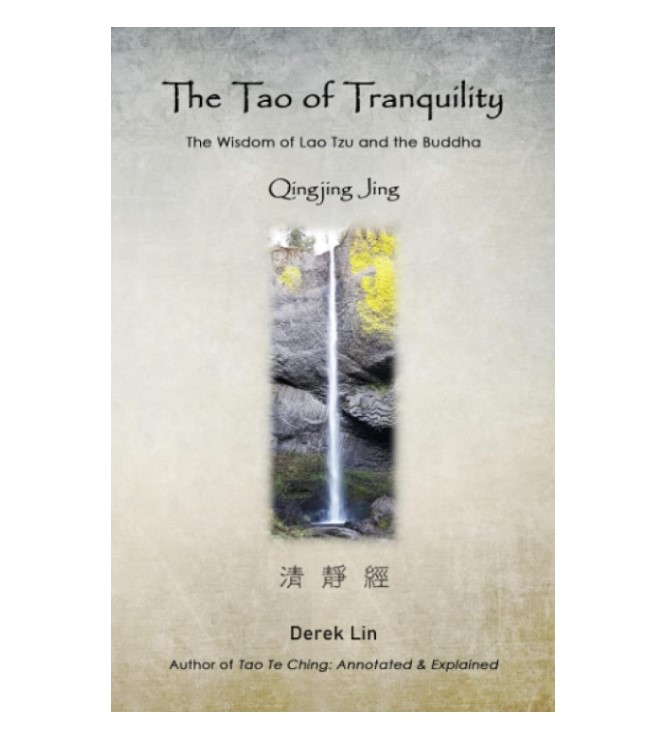
Screenshot of https://www.amazon.com/ 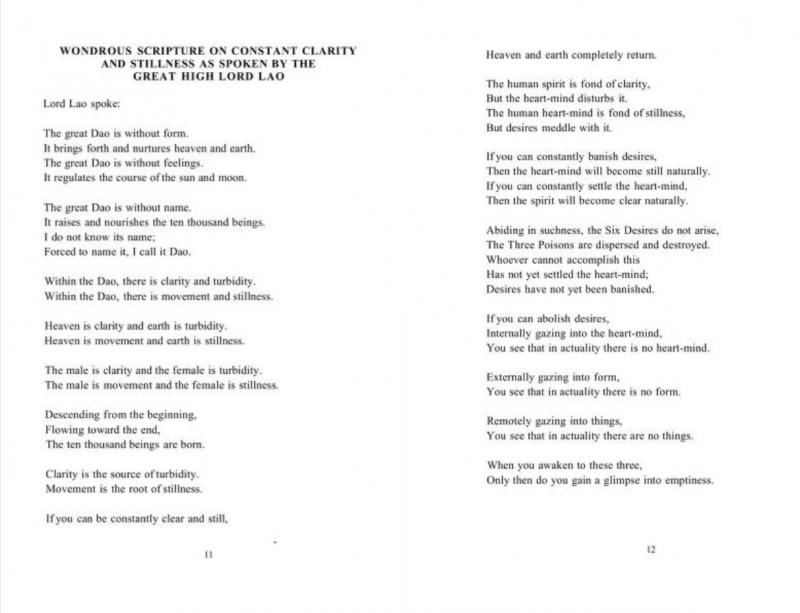
Screenshot of https://archive.org/details/daoist-scripture-qing-jing-jing-louis-komjathy/ -
The Huainanzi is a huge book filled with all sorts of awesome ideas from back in ancient China. Crafted during the Han dynasty by a consortium of scholars and thinkers, this monumental work represents a harmonious blend of Taoist philosophy, Confucian principles, and diverse schools of thought prevalent at the time.
Now, Huainanzi is really impressive because it's not just about one thing. Nope, it's like a whole library packed into one book! It's got all sorts of stuff inside—like stories, philosophy, nature talk, and even advice for leaders on how to run a kingdom. Imagine sitting in a room with a bunch of wise folks, and each one has something different and fascinating to share. That's what the Huainanzi feels like—it's a big mix of ideas from different smart thinkers of that time.
Unlike some ancient texts that focus narrowly on specific aspects, the Huainanzi opens its pages to a wide spectrum of human experiences and inquiries. There's this cool chapter about "ziran," which means naturalness. It's all about going with the flow of nature, kind of like being a part of a big dance with the universe. The Huainanzi talks about how understanding nature's patterns can teach us a lot about living in harmony with the world.
There's also a focus on leadership. The Huainanzi share ideas about how a good leader can run a kingdom wisely, treat people well, and follow the natural ways of the world. It suggests that leaders who embrace the Tao and act in harmony with its principles create environments where societies can thrive.
This text isn't just for scholars; it's like a guidebook for everyday life. Whether you're a leader or just someone looking to understand life better, the Huainanzi has some pretty awesome lessons about living in harmony with ourselves and the world.
Link to buy: https://www.amazon.com/Huainanzi-Practice-Government-Translations-Classics/dp/0231142048
Link to read: https://archive.org/details/theessentialhuainanziliuan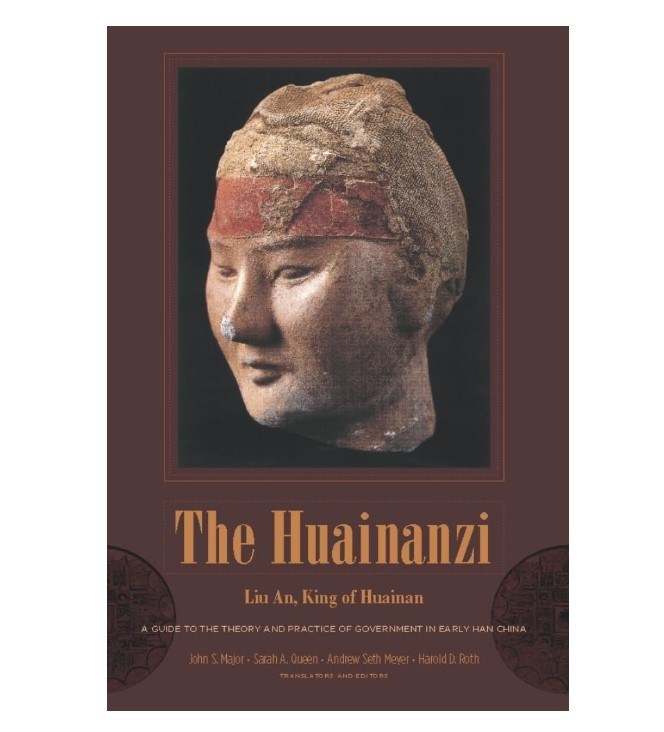
Screenshot of https://www.amazon.com/ 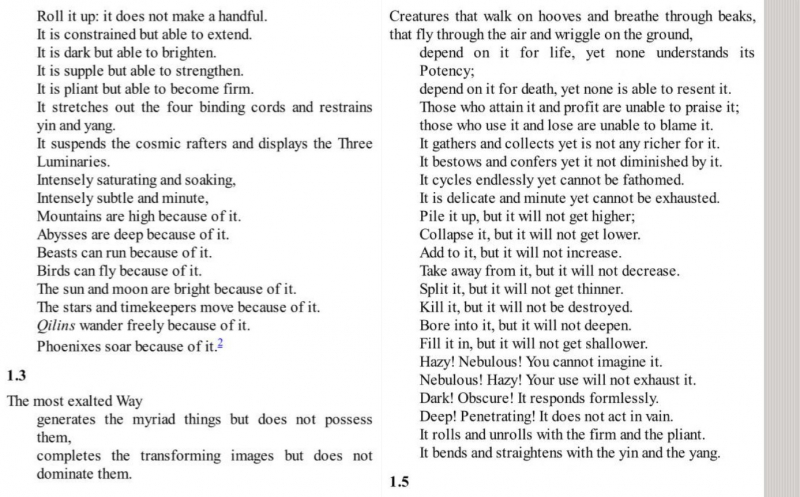
Screenshot of https://archive.org/details/theessentialhuainanziliuan -
The Huangdi Neijing, known as the Inner Canon of the Yellow Emperor, is among the most important Taoism sacred texts and a cornerstone of traditional Chinese medicine. Compiled over centuries, it comprises two main parts: the Suwen (Basic Questions) and the Lingshu (Spiritual Pivot).
Suwen, the first part, is like a health guidebook. It covers a wide range of topics about maintaining good health—diet, sleep, emotions, and living in harmony with nature. In conversations between the Yellow Emperor and his physician, it delves into fundamental questions about health and well-being.
The Lingshu, on the other hand, focuses on acupuncture and the flow of vital energy, or qi, within the body. It details the pathways through which qi circulates and offers insights into the principles of traditional Chinese medicine, particularly acupuncture and herbal remedies. Acupuncture, a practice where thin needles are inserted into specific points on the body, is aimed at ensuring the smooth flow of qi and restoring balance to the body's energy.
This ancient text places a lot of importance on yin and yang, the two opposing yet complementary forces in the universe. It explains how these forces exist within us, affecting our health. The Huangdi Neijing stresses the importance of balancing these energies to stay healthy and in harmony with the world around us.
At its heart, the Huangdi Neijing connects the body, mind, and emotions. It highlights how our lifestyle, emotions, and environment impact our health. It's not just about treating symptoms; it's about understanding the root causes of illness and preventing them. Whether one seeks an understanding of ancient medical practices or guidance for a healthier lifestyle, the Inner Canon of the Yellow Emperor remains a timeless source of wisdom and inspiration.
Link to buy: https://www.amazon.com/Yellow-Emperors-Classic-Medicine-Translation/dp/1570620806
Link to read: https://archive.org/details/HuangDiNeiJingSuWen
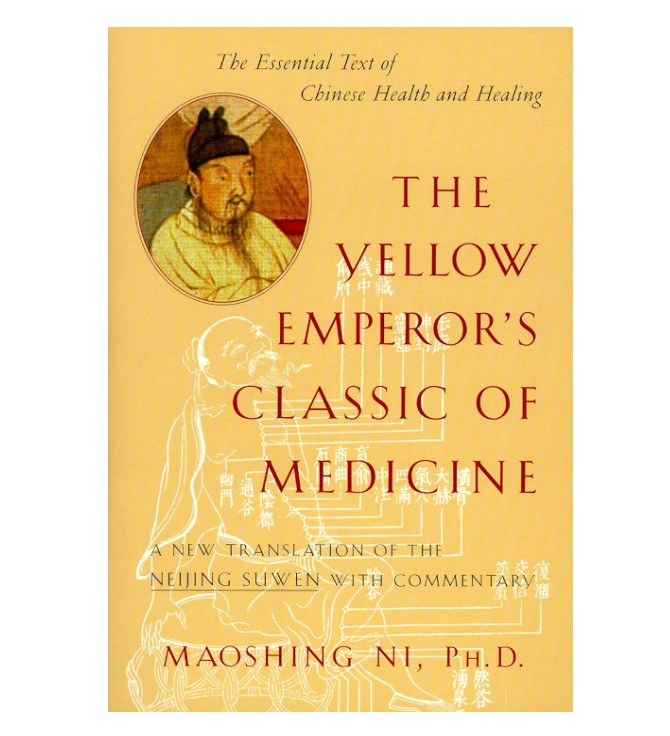
Screenshot of https://www.amazon.com/ 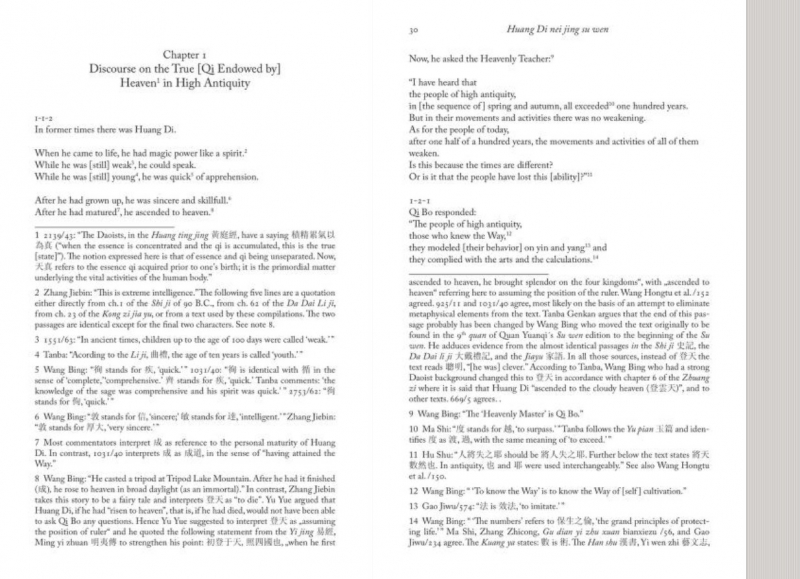
Screenshot of https://archive.org/details/HuangDiNeiJingSuWen -
The Baopuzi, also known as the Book of the Master Who Embraces Simplicity, is a significant Taoist text attributed to Ge Hong, an influential figure in ancient China. This book is like a treasure chest of wisdom that explores various aspects of Taoist philosophy, alchemy, immortality, and the pursuit of a balanced life.
Ge Hong's teachings in the Baopuzi are a mix of practical advice and deeper philosophical insights. He talks about leading a simple life, free from unnecessary desires and attachments. It's like saying, "Hey, sometimes less is more, and simplicity can lead to a happier life." The author also believes that being honest and true brings peace and strength inside us.
The Baopuzi takes a deep dive into the pursuit of longevity and immortality. It explores various practices, including alchemy and inner cultivation techniques, aiming to extend life and achieve better health. It's not just about living longer; it's about finding balance and harmony within oneself. A unique aspect of the Baopuzi is its discovery of mystical elements. Ge Hong discusses magical symbols and their significance, viewing them not merely as supernatural tools but as representations of deeper meanings and universal forces.
Ge Hong didn't just stick to one idea; he mixed Taoism with other philosophies and thoughts of his time. He wanted to show that there are different paths to understanding life and finding happiness. The text’s lessons about simplicity, authenticity, and harmony resonate across time, making it one of the most important Taoism sacred texts. It’s really a wise choice for those who are looking for a valuable guide for a balanced and meaningful life, regardless of background or beliefs.
Link to buy: https://www.amazon.com/Master-Who-Embraces-Simplicity-Philosopher/dp/B01LASWPR6/
Link to read: http://www.goldenelixir.com/taoism/texts_baopu_zi.html
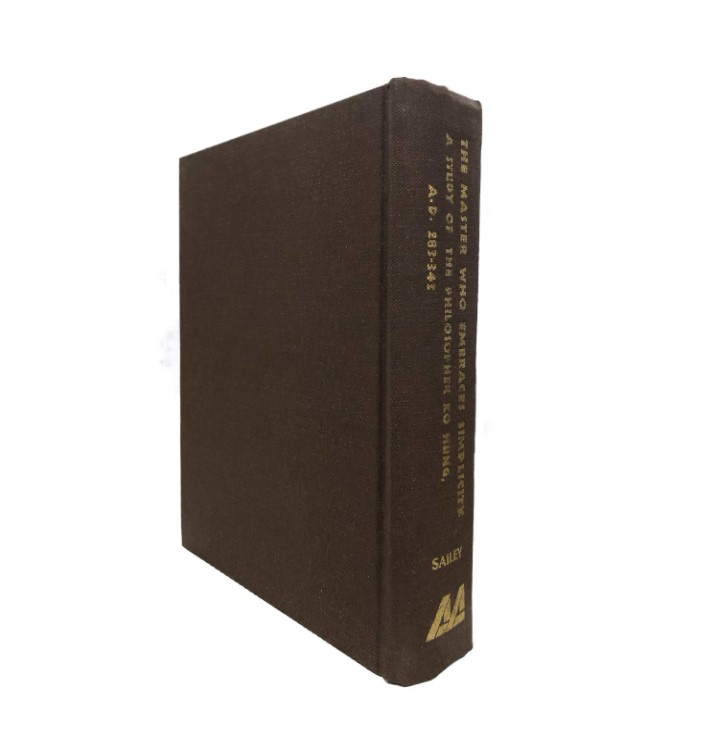
Screenshot of https://www.amazon.com/ 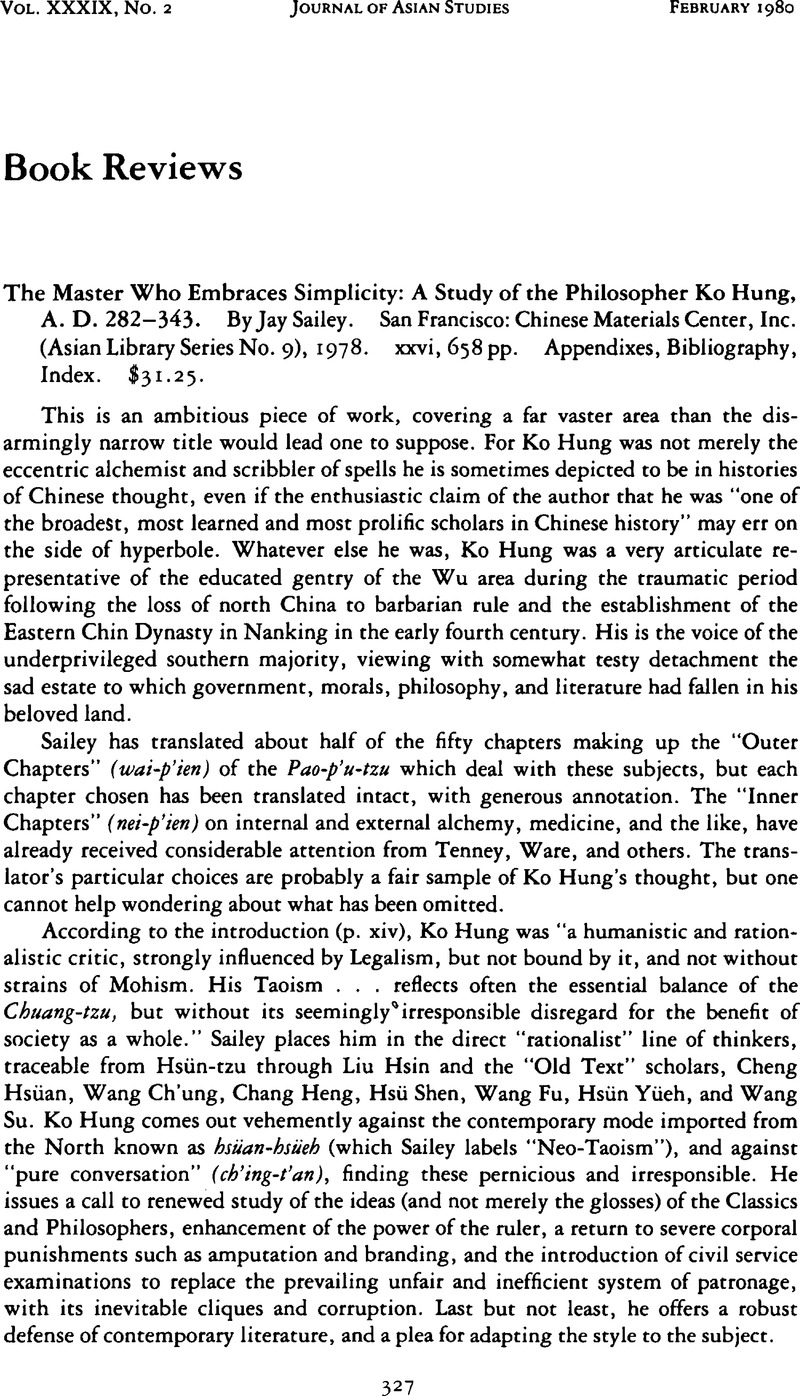
Screenshot of https://www.cambridge.org/core/journals/journal-of-asian-studies/article/abs/master-who-embraces-simplicity-a-study-of-the-philosopher-ko-hung-a-d-282343-by-jay-sailey-san-francisco-chinese-materials-center-inc-asian-library-series-no-9-1978-xiii-658-pp-appendixes-bibliography-index-3125/AAA1F662D5E963C910C85F0DC645CA35












